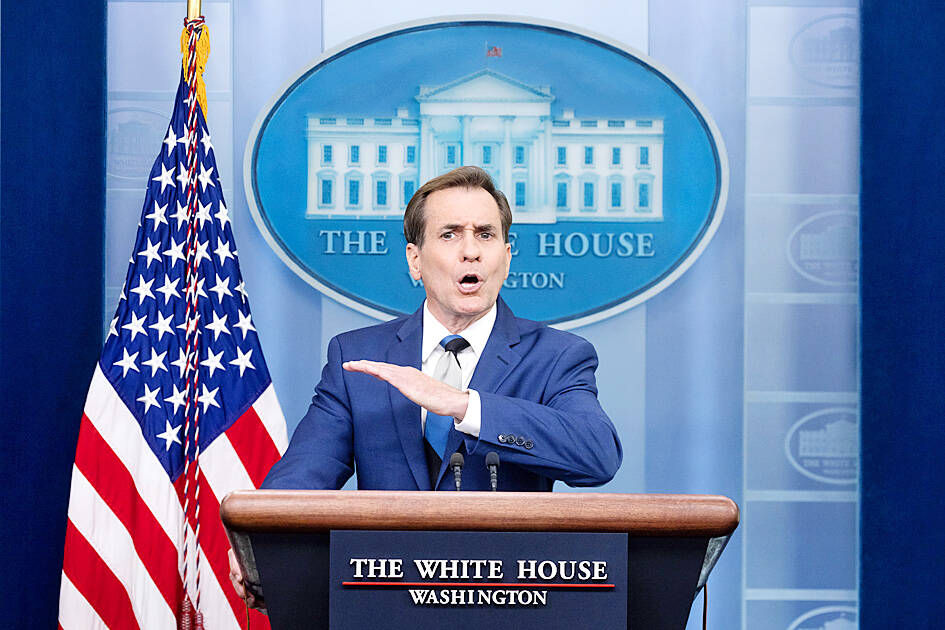The US has seen “no indication” that the situation in Taiwan warrants a review of its policy of not evacuating private US citizens from areas of conflict, US National Security Council spokesman John Kirby said on Monday, but did not disclose whether it was preparing for such a contingency.
The Messenger news site reported that the US government was drawing up evacuation plans for US citizens living in Taiwan, citing three anonymous sources with knowledge of the matter.
One of the sources, identified as a senior US intelligence official, told the Web site that planning had been under way for at least six months, but had “heated up” over the past two months.

Photo: EPA-EFE
Another source said Russia’s invasion of Ukraine has served as an impetus for the planning, by driving a “relook” at what plans are in place.
Asked about the report at a news conference, Kirby said it was not routine US policy to evacuate private US citizens from areas of conflict.
“And there is no indication at this time that current conditions in Taiwan would warrant any reconsideration of that policy,” he said.
Kirby said the US takes seriously its responsibility to ensure the safety of its citizens and personnel abroad, and has “routine procedures in place to make sure that we’re prepared for any type of emergency.”
The Taipei Economic and Cultural Representative Office in Washington said the issue of evacuation planning first came up in March, when Taiwanese media reported about a text message sent to US citizens in Taiwan by the American Institute in Taiwan (AIT).
The AIT at the time said the message was sent after a magnitude 7.8 earthquake and its aftershocks caused widespread damage in Turkey and Syria, to remind US citizens to prepare for any kind of potential disaster.
The Feb. 10 message, which is available on the AIT’s Web site, reminded US citizens that Taiwan is in a “region prone to disasters,” and encouraged them to enroll in the US Department of State registry for citizens living abroad and to have a “go-bag” ready in case of an emergency.

Taiwan has received more than US$70 million in royalties as of the end of last year from developing the F-16V jet as countries worldwide purchase or upgrade to this popular model, government and military officials said on Saturday. Taiwan funded the development of the F-16V jet and ended up the sole investor as other countries withdrew from the program. Now the F-16V is increasingly popular and countries must pay Taiwan a percentage in royalties when they purchase new F-16V aircraft or upgrade older F-16 models. The next five years are expected to be the peak for these royalties, with Taiwan potentially earning

STAY IN YOUR LANE: As the US and Israel attack Iran, the ministry has warned China not to overstep by including Taiwanese citizens in its evacuation orders The Ministry of Foreign Affairs (MOFA) yesterday rebuked a statement by China’s embassy in Israel that it would evacuate Taiwanese holders of Chinese travel documents from Israel amid the latter’s escalating conflict with Iran. Tensions have risen across the Middle East in the wake of US and Israeli airstrikes on Iran beginning Saturday. China subsequently issued an evacuation notice for its citizens. In a news release, the Chinese embassy in Israel said holders of “Taiwan compatriot permits (台胞證)” issued to Taiwanese nationals by Chinese authorities for travel to China — could register for evacuation to Egypt. In Taipei, the ministry yesterday said Taiwan

‘LIKE-MINDED PARTNER’: Tako van Popta said it would be inappropriate to delay signing the deal with Taiwan because of China, adding he would promote the issue Canadian senators have stressed Taiwan’s importance for international trade and expressed enthusiasm for ensuring the Taiwan-Canada trade cooperation framework agreement is implemented this year. Representative to Canada Harry Tseng (曾厚仁) in an interview with the Central News Agency (CNA) said he was increasingly uneasy about Ottawa’s delays in signing the agreement, especially as Ottawa has warmed toward Beijing. There are “no negotiations left. Not only [is it] initialed, we have three versions of the text ready: English, French and Mandarin,” Tseng said. “That tells you how close we are to the final signature.” Tseng said that he hoped Canadian Prime Minister Mark Carney

POSITIVE DEVELOPMENT: Japan and the US are expected to hold in-depth discussions on Taiwan-related issues during the meeting next month, Japanese sources said The holding of a Japan-US leaders’ meeting ahead of US President Donald Trump’s visit to China is positive news for Taiwan, former Japan-Taiwan Exchange Association representative Hiroyasu Izumi said yesterday. After the Liberal Democratic Party’s landslide victory in Japan’s House of Representatives election, Japanese Prime Minister Sanae Takaichi is scheduled to visit the US next month, where she is to meet with Trump ahead of the US president’s planned visit to China from March 31 to April 2 for a meeting with Chinese President Xi Jinping (習近平). Japan and the US are expected to hold in-depth discussions on Taiwan-related issues during the